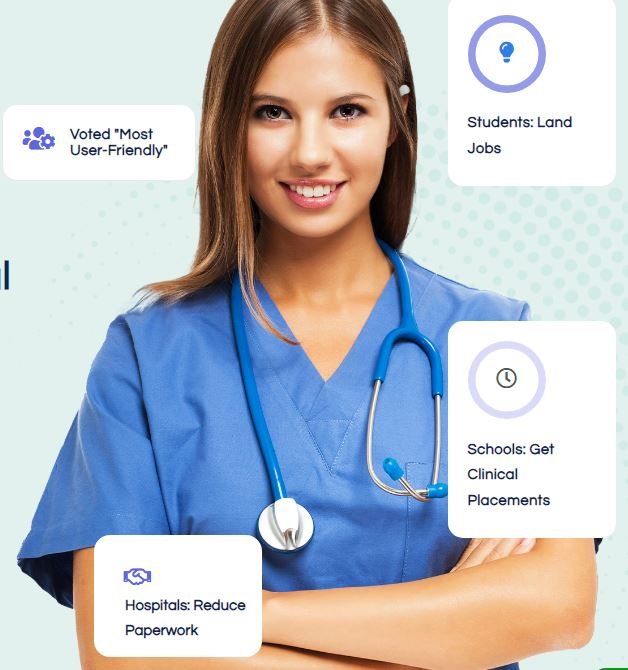Online, automated scheduling in healthcare facilities, especially as it concerns nursing student rotations, has many benefits for administrative staff from educational institutes and nurse practitioner clinical sites, as well as nursing students. Increased efficiency, accuracy, and improved communication mean that processes can be streamlined, people can focus their time on their primary roles, and patient outcomes are ultimately improved. Another benefit of online scheduling platforms is improving staff and student accountability. This article will examine some of the ways in which online scheduling platforms can improve and increase accountability.

Data tracking/ history
Online platforms can store scheduling data, allowing administrators to track who has made scheduling changes (with date-timestamp information). This can be useful if any information is changed after the fact, without permission, or for untoward reasons. This can also be useful in calculating fair hour allocation and confirming shifts without relying on manual input. Intelligent systems can allow staff and students to log shifts worked, and data-tracking will enable administrators to compare this information with assigned schedules. An automated system ensures that students are allocated equal time for practical exposure. For nursing practice staff, these automated systems also ensure they work their contracted hours as agreed.
Performance tracking
Nursing student rotations are crucial to any clinician’s educational and practical journey to becoming qualified. Each nursing student’s educational institute and the nurse practitioner clinical sites at which they practice need to be able to track and record academic and practical performance. This can help keep students on track and on target to reach their short- and long-term goals. Administrators' and mentors' ability to access students’ performances can allow them to intervene if necessary and decide whether the student is a good fit for the profession. For students and existing staff, other data such as attendance, compliance, and patient feedback can also be incorporated, meaning continuous accountability exists.
Improved compliance
If compliance and due diligence regulations are input into online platforms, automated prompts, and reminders can ensure that staff, students, and institutions fulfill all requirements. This is extremely important to ensure staff and patients' safety and optimum care in healthcare facilities. Systems can have checkboxes that must be completed before certain scheduling decisions can be made, ensuring that all parties meet necessary expectations.
Automated Reminders and Notifications
Scheduling systems remind staff and students of where they need to be when. Calendar notifications and SMS or email-enabled notifications make it more difficult for staff to miss shifts and students to miss their placements. In this way, tech integrations hold staff and students more accountable for their time, making it easier for managers and supervision staff to keep their students’ or trainees' attendance records up to date. Although life can get busy for anyone, these features help users take ownership of their responsibilities, improving overall accountability. It also reduces the likelihood of no-shows due to misunderstanding or misinterpretation.
Self-Scheduling Capabilities
Having a transparent scheduling system also helps staff management, and student scheduling needs last-minute adjustments. As mentioned, things can’t run 100% according to the plan all the time, so contingency plans are necessary in the event of absenteeism. When staff and students have their schedules to hand ahead of time, it can be far easier for staff and management to make arrangements for coverage if someone cannot make their shift. In this way, understaffing can be avoided and students can switch their placement times with others should they need to.
Centralized Record Keeping and Comms
For students, accurate record-keeping through a centralized platform can ensure that there is no uncertainty regarding practical performance or attendance, which can help to keep their graduation process safely on track. For staff and students working at healthcare facilities, online platforms with internal communication channels can ensure a healthy workplace environment by promoting open communication and working to resolve any issues that arise together. In the case that institutional faults are causing frustration in the workplace, staff members or students can communicate and discuss solutions and approach institutions in a unified way. This can also apply to problems, challenges, or incidents involving patients, fellow staff members, and students. Online scheduling platforms allow administrators to access attendance logs to manage and resolve HR issues with the relevant parties. This helps to protect employees and ensure that employers take action when necessary.
Hello.
There is reasonable evidence that this article is machine-generated.
We would appreciate it if you could avoid publishing AI-generated content (full or partial texts, art, etc.).
Thank you.
Guide: AI-Generated Content = Not Original Content
If you believe this comment is in error, please contact us in #appeals in Discord.